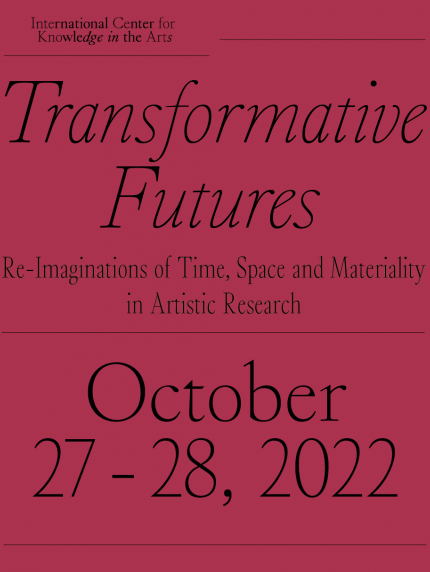Transformative Futures: Re-Imaginations of Time, Space and Materiality in Artistic Research
27-28 October 2022 at Kunsthal Charlottenborg & Rhythmic Music Conservatory
Lucia D’Errico, Ole Lützow Holm, Honey Biba Beckerlee, Jussi Parikka, Aslak Aamot Helm (Diakron), Elvia Wilk, Emil Rønn Andersen, Viktorija Šiaulytė og Marta Dauliūtė, Joachim Hamou & Shakira Kasigwa Mukamusoni (Trampolinhuset), Søren Kjærgaard & Torben Snekkestad, David Toop among others.
Venue: Kunsthal Charlottenborg & Rhythmic Music Conservatory, Copenhagen
Selected parts of the program will also be available as a live stream on our YouTube channel
For registration and the program schedule please visit this page.
For its fourth annual symposium, The International Center for Knowledge in the Arts emphasizes the urgency of Artistic Research in a two-day program of talks, exhibition tours, workshops and performances at Kunsthal Charlottenborg and the Rhythmic Music Conservatory. Under the banner of Transformative Futures, the symposium explores how artistic research can generate new knowledge in the face of planetary crises, through practices that re-imagine the relationships between time, space and materiality.
In the program you will encounter artists and thinkers that challenge notions of linear development in technology, ecology and knowledge cultures in order to simultaneously learn from the past, present and future. In the work of Honey Biba Beckerlee, the idea of the digital as a clean virtual site is challenged through close material investigations of the processes of natural resource extraction at the basis of contemporary technology. Information networks, and the humans that develop and use them, are, as Beckerlee have argued, deeply embedded in the biological and geological cycles of the earth.
The symposium further explores how a change in our perceptions of the borders between human and non-human worlds needs to come in place, not the least in order to understand the terms of the planetary climate crisis. Such terms are explored in the work of the collective Diakron, who in collaboration with artist Emil Rønn Andersen and writer Elvia Wilk are speculating on the relations between data, knowledge and storytelling within the context of climate science.
Our environmental and infrastructural crises, also mean that living space becomes a commodity and privilege for the few. In a session exploring this issue, two presentations feature artistic projects that discuss the political imagination of the future in different cases of living precariously. In the film and research project Good Life, Viktorija Šiaulytė and Marta Dauliūtė enters into the world of corporate co-living/working spaces and engage in a process of producing knowledge across seemingly irreconcilable political positions. The work of the collective Trampolinhuset, also engages fields outside of art in order to enact change, and in their case, collectively imagine a better asylum system.
These and other contributions resonate with the position of the symposium’s opening keynote by musician-researcher Lucia D’Errico. She emphasizes the “power of divergence” between a system or a model, such as that between a written score and its performance, in which the performance, through its irreducible materiality opens up to difference. Along these lines, the symposium will be brought to a close at the Rhythmic Music Conservatory, where the artistic research project Traversing Sonic Territories by Søren Kjærgaard & Torben Snekkestad will play out with an array of sonic collaborators.
The urgency of artistic research for bringing about transformative futures is not that of envisioning utopias or dystopias, it lies rather in arranging the composition, playing the tune, performing the choreography or telling the story, differently.
